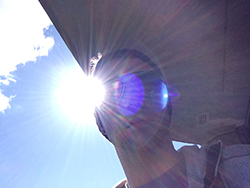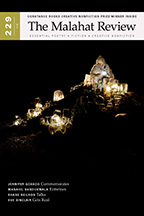Walk the Line of Sense and Comfort: PJ Grace in Conversation with Cody Klippenstein

Malahat volunteer PJ Grace talks with Spring 2013, #182 issue author Cody Klippenstein about her short story "Dainty, Pretty Things."
Let’s talk literary journal publication. This past year, you won first place in The Fiddlehead’s 2012 Fiction Contest, and you won Zoetrope’s All-Story Fiction Contest. Your story “Dainty, Pretty Things” was a finalist for The Malahat Review’s 2013 Open Season Awards, and also appears in The Malahat Review’s Spring 2013 issue, #182. How does it feel to have accomplished all this as an undergrad in UVic’s Creative Writing program? Any chance you’re pursuing graduate studies in writing?
I wish I could say something more interesting than Pretty unbelievable, but there it is. I already loved stories when I began my studies at UVic, but I didn’t realize how much or how quickly I’d grow to love storytelling. I really just want to keep doing it. I have a little more hope now that it might actually be possible somewhere down the road to get up every morning, sit at a desk and write.
As for graduate studies – yes! I’m excited to be attending Cornell for my MFA in fiction this coming fall.
Some of your winning stories were originally submitted for workshops within UVic’s Creative Writing department. What—or who—encouraged you to submit these stories for publication?
I think it was a combination of support from instructors in the writing program and also this desire to get more involved with the journals that publish work I admire. I find that reading and writing have a direct effect on each other: making my way through an issue of Zoetrope: All-Story that has work by Karen Russell, or Ryu Murakami, or Steven Millhauser in it, for example, gets me excited about the act of writing all over again, and reminds me to take risks with voice, structure, and narrative in my own work. Eventually, it has me returning to the journals I’ve been inspired by as a name in their slush pile or stack of contest submissions.
In workshops, it was Matthew Hooton’s encouragement, months before I had begun considering submitting to publications, that got me to feel like I was ready to start putting my work out there in the first place. Sometimes all it takes is a few words from someone whose opinion you trust to make you take that step forward.
I was blown away by your story “Dainty, Pretty Things” for numerous reasons, most notably its Western feel and the unconventional sentence structure. You’re a master with words—every verb and noun feels carefully chosen, as it should be in fiction. How would the omission of the Western style affect the tone and the syntax of the piece? Was this inherent from the first draft after establishing character and setting?
Thank you! The story is told through Hugh’s point of view, who has been shaped – or eroded – by the landscape he’s a part of. So I like to think that taking the Westernfrom the story would take away his voice, too, and what defines him as a character.
When I was still in the thinking phase for “Dainty, Pretty Things,” I considered using the third person point of view. The voice I ended up putting to paper when I actually got down to it, though, wasn’t mine at all. “I” ended up being the second word I wrote – “Would I taste it?” – and Hugh immediately felt like the most comfortable vehicle for the narrative, so I went with it. In retrospect, I don’t feel like my own authorial voice would have been the best choice anyway; I’m not close enough to the geography or the history behind this piece. Or, rather, I wanted to have the reader feel like they’re as close to the geography and history behind this piece as possible.
Do you read or write poetry? I ask because there’s such a wonderful juxtaposition of light and dark, a poetic contrast of gold and diamonds with blood and dirt throughout the piece. Can you tell us more about this tension?
Sure do. I read poetry whenever I’m not reading fiction, and I love it in part because it’s full of great examples of how to achieve images that are sharp and startling, that walk the line of sense and comfort.
With “Dainty, Pretty Things,” I wanted to keep a lot of those telltale Western themes and tropes – Good men versus Bad men, riches and temptation, roughness and redemption – but twist them a little. Turn them into questions. What exactly characterizes a Good man or a Bad one, and isn’t everyone a little of both? Does giving in to temptation make one more of either or? And what about the lady caught in the middle of the showdown: how fragile or helpless is Fool if she is in such careful control of what she does and doesn’t give in to? I guess this is a long-winded way of saying that, for me, poetic imagery is a way to work these questions into the story without addressing them directly – though in my first drafts, very little of it is done consciously.
The first character we’re introduced to in the story is Fool, and the only word she utters is “waltz.” I’m feeling a kind of monosyllabic importance here, something small representing something much larger. Then again, maybe I’m reading too much into this. I’ll let you, as the author, discuss this more.
It’s really neat that you brought this up – though I still hope it will remain open to interpretation. In the end, “waltz” means what the reader thinks it means, even if that’s nothing at all. What I can say is that Fool is unapologetically out of place in the west. To the couple whose home she intrudes upon, she’s a fable, a ghost, and a reminder of everything Hugh and Rebecca gave up separately. As far as they both know, she seems to move without intelligible purpose – but it’s also possible that she’s perfectly aware of what she’s doing, that her actions make sense when put in context of that unknowable past of hers.
I understand you’re working on a longer manuscript. Can you offer any details?
I both love this question and never have any idea what to say about it. Details: I’m mostly certain that there will be dinosaur bones in this manuscript, as well as an unfamiliar setting, a man who has many identities, a skirmish that may or may not become a full-blown revolution by the time I’m finished writing, and books. Lots of books. Funny, that list kind of makes it sound like I’m writing a novel about Indiana Jones, but to my knowledge there will be no mention of Indiana Jones anywhere, not even a brief cameo, and I hope that doesn’t change, and if it does change, I really hope I catch it in the editing process.

PJ Grace
* * * * * * * *









